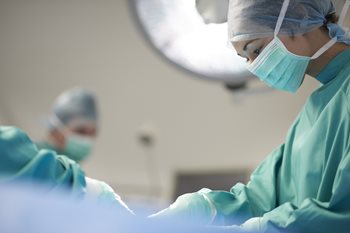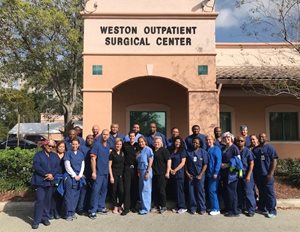By Melissa Ramirez Cooper
Director, AANA Public Relations & Communications
Samantha Heavrin, CRNA, MBA, was among one of the first to arrive in New York City to serve on the COVID-19 pandemic’s frontline of care. Assigned to work at The Mount Sinai Hospital on Madison Avenue, Heavrin had three “identities” for her computer sign-in: nurse, advanced practice nurse practitioner, and Certified Registered Nurse Anesthetist (CRNA).
“Later in my deployment, I was also given a fourth identity as respiratory therapist,” said Heavrin, a member of the American Association of Nurse Anesthetists (AANA) who is chief of anesthesia at an ambulatory surgery center in Louisville, Ky. Through her contract with AMSURG, Heavrin was part of about 200 Envision clinicians who deployed to the greater New York City area to provide care.
“At Mount Sinai, we did whatever was needed, and that was true for all healthcare workers across New York City,” she said. “Whether it was changing drips, running labs, getting materials, or turning a patient, all of us worked outside of our traditional roles.”
Heavrin said her entire anesthesia team took on multiple responsibilities. “There was so much to be done to care for patients impacted by COVID-19,” she said. “We also served on ‘proning’ teams, which is a process of turning patients onto their stomachs so they can take in oxygen better. It can be a difficult process to have intubated patients move onto their stomach, but it made a huge different for patients to oxygenate, and our proning teams were great.”
Throughout the pandemic, tens of thousands of CRNAs like Heavrin were readily available to serve. CRNAs are expert clinicians with advanced specialized skills in airway management, ventilator support, vascular volume resuscitation, and advanced patient assessment. Because of their diverse and unique skillset, CRNAs have been utilized as advanced care providers and regarded as vital members of the nation’s critical care workforce. During the COVID public health crisis federal and state governors have temporarily removed barriers to CRNA practice, enabling them to practice to the fullest extent of their education and training.
Alongside her colleagues at the hospital, Heavrin had friends deployed in other parts of the city. “One of my nurse practitioner friends worked in tents set up in Central Park. When we looked out the window, we could see these MASH-type units set up by the military to triage patients.”
Heavrin is thankful to her employer for the support services extended to clinicians, which included, among many things, traveling logistics, supplies of personal protective equipment, and mental health and wellness resources.
“When we left New York, we had to go into quarantine for two weeks. We were encouraged to do video calls and talk about our experiences with our clinician peers. We were also provided resources and information. It was during quarantine when we really processed our experience, talked and cried.”
Since returning home to Kentucky, Heavrin and her friends journaled about their time in New York and wrote a book chronicling their experiences.


